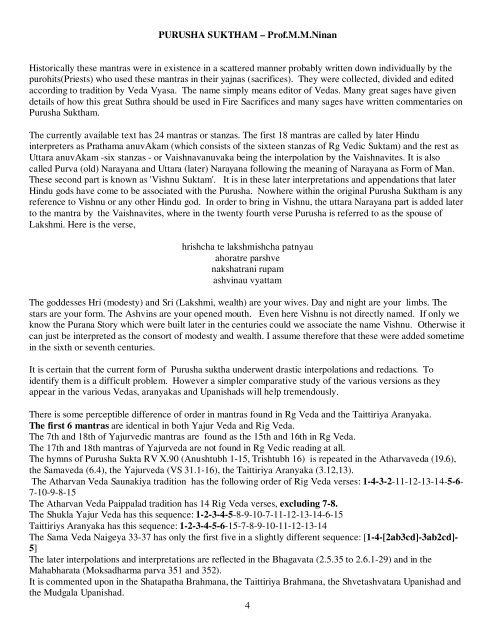You also want an ePaper? Increase the reach of your titles
YUMPU automatically turns print PDFs into web optimized ePapers that Google loves.
PURUSHA SUKTHAM – Prof.M.M.Ninan<br />
Historically these mantras were in existence in a scattered manner probably written down individually by the<br />
purohits(Priests) who used these mantras in their yajnas (sacrifices). They were collected, divided and edited<br />
according to tradition by Veda Vyasa. The name simply means editor of Vedas. Many great sages have given<br />
details of how this great Suthra should be used in Fire Sacrifices and many sages have written commentaries on<br />
<strong>Purusha</strong> Suktham.<br />
The currently available text has 24 mantras or stanzas. The first 18 mantras are called by later Hindu<br />
interpreters as Prathama anuvAkam (which consists of the sixteen stanzas of Rg Vedic <strong>Suktam</strong>) and the rest as<br />
Uttara anuvAkam -six stanzas - or Vaishnavanuvaka being the interpolation by the Vaishnavites. It is also<br />
called Purva (old) Narayana and Uttara (later) Narayana following the meaning of Narayana as Form of Man.<br />
These second part is known as 'Vishnu <strong>Suktam</strong>'. It is in these later interpretations and appendations that later<br />
Hindu gods have come to be associated with the <strong>Purusha</strong>. Nowhere within the original <strong>Purusha</strong> Suktham is any<br />
reference to Vishnu or any other Hindu god. In order to bring in Vishnu, the uttara Narayana part is added later<br />
to the mantra by the Vaishnavites, where in the twenty fourth verse <strong>Purusha</strong> is referred to as the spouse of<br />
Lakshmi. Here is the verse,<br />
hrishcha te lakshmishcha patnyau<br />
ahoratre parshve<br />
nakshatrani rupam<br />
ashvinau vyattam<br />
The goddesses Hri (modesty) and <strong>Sri</strong> (Lakshmi, wealth) are your wives. Day and night are your limbs. The<br />
stars are your form. The Ashvins are your opened mouth. Even here Vishnu is not directly named. If only we<br />
know the Purana Story which were built later in the centuries could we associate the name Vishnu. Otherwise it<br />
can just be interpreted as the consort of modesty and wealth. I assume therefore that these were added sometime<br />
in the sixth or seventh centuries.<br />
It is certain that the current form of <strong>Purusha</strong> suktha underwent drastic interpolations and redactions. To<br />
identify them is a difficult problem. However a simpler comparative study of the various versions as they<br />
appear in the various Vedas, aranyakas and Upanishads will help tremendously.<br />
There is some perceptible difference of order in mantras found in Rg Veda and the Taittiriya Aranyaka.<br />
The first 6 mantras are identical in both Yajur Veda and Rig Veda.<br />
The 7th and 18th of Yajurvedic mantras are found as the 15th and 16th in Rg Veda.<br />
The 17th and 18th mantras of Yajurveda are not found in Rg Vedic reading at all.<br />
The hymns of <strong>Purusha</strong> Sukta RV X.90 (Anushtubh 1-15, Trishtubh 16) is repeated in the Atharvaveda (19.6),<br />
the Samaveda (6.4), the Yajurveda (VS 31.1-16), the Taittiriya Aranyaka (3.12,13).<br />
The Atharvan Veda Saunakiya tradition has the following order of Rig Veda verses: 1-4-3-2-11-12-13-14-5-6-<br />
7-10-9-8-15<br />
The Atharvan Veda Paippalad tradition has 14 Rig Veda verses, excluding 7-8.<br />
The Shukla Yajur Veda has this sequence: 1-2-3-4-5-8-9-10-7-11-12-13-14-6-15<br />
Taittiriys Aranyaka has this sequence: 1-2-3-4-5-6-15-7-8-9-10-11-12-13-14<br />
The Sama Veda Naigeya 33-37 has only the first five in a slightly different sequence: [1-4-[2ab3cd]-3ab2cd]-<br />
5]<br />
The later interpolations and interpretations are reflected in the Bhagavata (2.5.35 to 2.6.1-29) and in the<br />
Mahabharata (Moksadharma parva 351 and 352).<br />
It is commented upon in the Shatapatha Brahmana, the Taittiriya Brahmana, the Shvetashvatara Upanishad and<br />
the Mudgala Upanishad.<br />
4


















